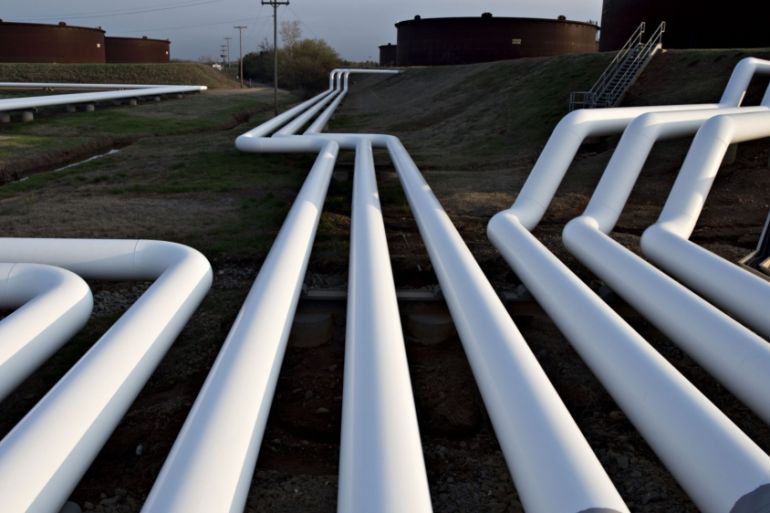Oil prices dip on doubts over supply cuts, growing US fuel stocks
Markets reacted to a failure by major oil producers to meet on Thursday to discuss extending oil output cuts into July.

Oil prices dropped on Thursday, reversing gains in the previous session, on concern over whether major crude producers will be able to agree to extend record output cuts, heightened by worries over a huge build-up in distillate inventories in the United States.
Brent crude futures fell 1.46 percent or 58 cents, to $39.21 a barrel as of 04:59 GMT, while US West Texas Intermediate (WTI) crude futures slid 1.98 percent, or 74 cents, to $36.55 a barrel.
Keep reading
list of 3 itemsSaudi Arabia moved $40bn in reserves to sovereign fund
Oil gains on signs of improving demand, drawdown in inventory
More:
Saudi Arabia and Russia, two of the world’s biggest oil producers, have agreed to support extending into July the 9.7 million barrels per day (bpd) in supply cuts backed in April by the OPEC+ group, comprised of the Organization of the Petroleum Exporting Countries (OPEC) and other major producers.
But they failed to agree on holding an OPEC+ meeting on Thursday to discuss the cuts, with OPEC sources saying it would be conditional on countries that have not complied with their targets so far deepening their cuts.
“The market has taken a look at that and said it’s getting more complicated to get that deal over the line,” said Lachlan Shaw, head of commodity research at National Australia Bank.
That would imply OPEC+ would go back to what they agreed in April, which was to ease their supply cuts to 7.7 million bpd from July, he said.
Further, Saudi Arabia and other Gulf producers Kuwait and the United Arab Emirates are not planning to extend voluntary additional output cuts of 1.18 million bpd after June, indicating crude supply could rise next month no matter what OPEC+ decides.
“Saudi Arabia and Russia are keen on ensuring that all members comply with the current deal. In particular, Iraq and Nigeria, whose compliance over May came in at just 42 percent and 33 percent respectively,” Dutch investment bank ING said in a research note sent to Al Jazeera.
“It does appear that any extension of current cuts will be largely dependent on these countries improving their compliance levels, and potentially even making up for their lack of compliance in May. Failing to do so would mean that the deal likely stays in its current form,” the bank’s commodities strategists Warren Patterson and Wenyu Yao said.
The huge build in distillate inventory in the US, the world’s biggest oil user, also weighed on prices, said CMC Markets’ chief market strategist Michael McCarthy.
US Energy Information Administration data on Wednesday showed gasoline stocks rose by 2.8 million barrels, nearly triple what analysts had expected, while distillate stocks rose by 9.9 million barrels, or nearly four times more than expected.
Overall demand for diesel and similar fuels is down 13 percent from the year-ago period over the last four weeks. Gasoline product supplied, a proxy for demand, picked up last week, but the four-week average still shows a 23 percent drop from the year-ago period.
“It shows the recovery in gasoline and distillate demand is not V-shaped. It just reinforces that we’ve had this initial (price) recovery driven by supply-side discipline,” Shaw said.